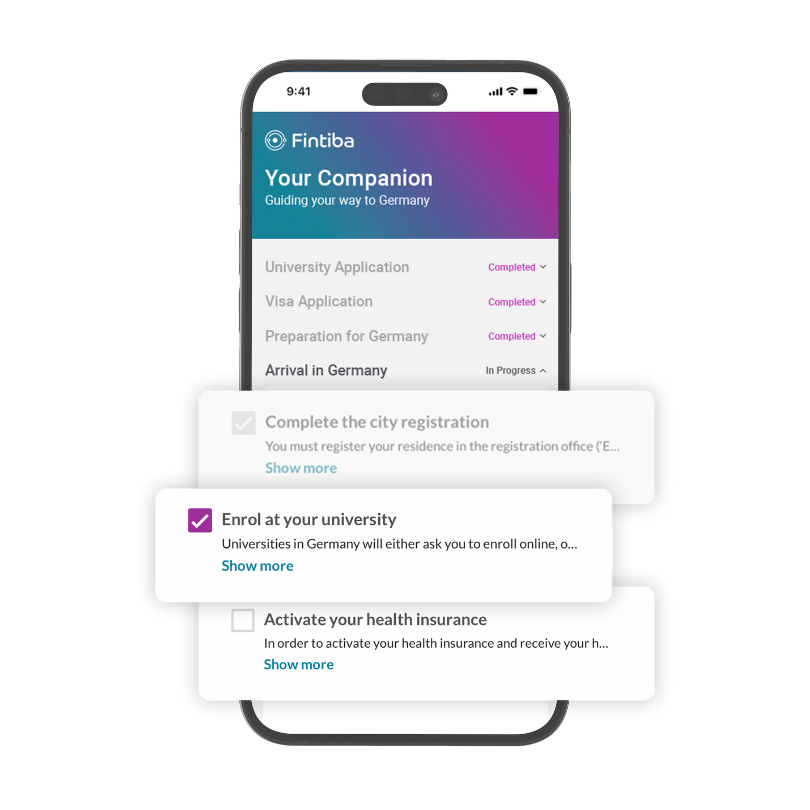It is a legal requirement that all residents must have health insurance in Germany. Internationals must have sufficient health insurance coverage to obtain a visa. Similarly, getting a residence permit requires providing proof of adequate medical coverage throughout the stay. When preparing for your move, it is crucial to learn about the requirements of travel, private and public health insurance in Germany.
The German health insurance system
The German healthcare system is one of the best in Europe. Since 2009 every person that has a residence in Germany is obliged to have health insurance. This also includes internationals in Germany. Whether someone is studying, working, or simply visiting Germany, they are required by law to be covered by health insurance.
There are two main types of health insurance available: public health insurance (also known as statutory or governmental) and private health insurance. An additional type of health insurance is the travel health insurance. This is a requirement for obtaining a visa to travel to Germany.
Below you will find more details about these different health insurance types.
Travel health insurance for your German entry visa
When moving to Germany, you will need health insurance for your entry visa and a different insurance coverage for your stay in Germany. Make sure to learn the difference in the requirements beforehand to prepare your application documents correctly. This will increase your chances of getting a visa or residence permit in time.
While still in your home country, it can be challenging to get in contact with German companies. It can also be difficult to organize necessary documents without proper registration in Germany or supporting certificates. Health insurance is no exception. Therefore, make sure you are adequately insured when for the first few months in Germany until you have everything sorted out.
Private health insurance providers offer a simple solution for visa applicants, which can be obtained from another country without extra paperwork. This form of insurance is often referred to as “travel” or “incoming” health insurance. If you require a visa to enter Germany, travel health insurance is a mandatory requirement to obtain a German visa.
In most cases, you can use this insurance during your first months in Germany. Then you can later change to a more suitable option like public health insurance. Alternatively, you can opt to remain privately insured for the duration of your stay.
> Learn more about the health insurance types in Germany below.

Get guidance throughout your journey to Germany
Say goodbye to feeling overwhelmed while planning your journey to Germany! Our free comprehensive checklist provides you with an overview of your to-dos at all stages of your German adventure. From your visa application to settling in Germany – we’ve got you covered!
Register for the Fintiba Companion for a smooth and seamless relocation process!
What are the requirements for travel health insurance for Germany?
Make sure to check which health insurance requirements are listed by the specific embassy you will visit for your visa application. Typically, there are two basic conditions that your travel health insurance needs to fulfil – sufficient coverage and duration.
How long do I need to be covered by my travel health insurance?
Applicants usually need to provide a health insurance certificate for at least the first 3 months of their stay. However, some embassies might also require you to be covered for a period of 6 months after entry.
What coverage do I need for my travel health insurance for Germany?
Your travel health insurance should have coverage of at least €30,000. At best, you need to have unlimited coverage offered by your health insurance provider. Additionally, the insurance should also cover all Schengen countries.
It is also important that your travel health insurance for Germany covers unforeseen medical costs, like emergency medical care and hospitalisation.

Get a FREE travel health insurance for Germany with our Fintiba Plus package!*
Our special blocked account and health insurance bundle comes with free travel health insurance for your German entry visa. The package also includes a whole list of extra benefits.
Public health insurance in Germany
Public health insurance is also known as governmental, statutory or “Gesetzliche Krankenversicherung“. A limited number of public health insurance providers operate in the German market. The government strictly regulates their operations as well as their pricing policies. The system is designed to ensure that everyone has equal and affordable access to medical services.
For most people, internationals and German citizens alike, enrolling in public health insurance is often compulsory if you earn less than a specific income threshold. This currently lies at €66,600 per year (2023).
How does public health insurance work in Germany?
Once you apply for public health insurance, you will also receive a health insurance card with a number from your provider. You will always have to take this card with you to your doctor or hospital visit.
With public insurance, you do not need to make any upfront payments when you seek medical services. The doctor’s office or hospital will directly bill the insurance company for the services provided.
Additionally, you will pay a monthly premium to your provider based on your income. This cost will be shared between you and your employer and will be directly deducted from your wage.
The contribution system is usually different for publicly insured (international) students. Read more about this here.
What does public health insurance cover?
Public health insurance in Germany offers extensive coverage to ensure you do not face financial burdens due to medical reasons. The coverage includes but is not limited to:
- Doctor visits (Hausarzt)
- In- and out-patient treatment
- Prescribed medication
- Surgery
- Maternity care
- Basic dental care
- Preventive check-ups
Please note that while public health insurance does provide comprehensive coverage, some services may not be fully covered. In these cases, you might either need to pay additional costs or get additional private insurance (e.g. for more extensive dental coverage).
Private health insurance in Germany
Private health insurance (“private Krankenversicherung“) in Germany is mainly designed for those who earn more than the €66,600 per year threshold or are self-employed.
Additionally, private health insurance providers often offer special prices tailored to the needs and length of stay of international visitors in Germany. Therefore, it is better suited for individuals with temporary plans in Germany, such as au pairs, job seekers, or language students.
Universities also require private health insurance coverage for students who are 30 years of age or older. Although you can still sign up for public health insurance, private insurance is much more affordable and simpler to apply for.
Learn more about private health insurance for students here.
How does private health insurance work in Germany?
The private health insurance system differs significantly from the public system. The premiums are calculated based on individual factors such as age, health condition and selected coverage. Most private insurance providers require you to do a medical test before finalising a contract and may reject you if you have a chronic conditions.
Keep in mind that with private health insurance, all treatment costs must be paid upfront by the policyholder. After that, upon submission of an invoice, the private health insurance provider will refund the expenses (cost reimbursement principle).
It is important to note that choosing private health insurance in Germany requires careful consideration of your healthcare needs, financial situation, and long-term plans. This is because switching back to public insurance could be challenging and you might not be eligible anymore.
What does private health insurance cover?
Compared to public health insurance, private health insurance provides a wider selection of coverage options and offers more flexibility. In most cases, you are free to customise an insurance plan that fits your needs. Here are some additional services that private health insurance may cover:
- Shorter waiting times for specialist appointments and selected procedures
- Private hospital room in case of admission
- Extensive dental procedures including cleanings
- Medical treatment and emergencies when travelling abroad
Be sure to carefully read the terms and conditions of the private health insurance policy. This assures that you are well informed of the coverage plan and its limitations.
Overview: Private vs public health insurance in Germany
| Aspect | Public health insurance | Private health insurance |
|---|---|---|
| Eligibility | Students under 30 Employees earning less than a defined sum Certain self-employed persons | For students over 30 or who have passed their 14th semester Employees earning more than the defined sum Civil servants Freelancers |
| Coverage | Covers general medical needs, including basic dental care. | More specific treatments are also covered. Coverage options can be customised. |
| Cost | Mostly more affordable as the premium rate is defined by the state. | Premiums depend on age, health status, and desired coverage of policyholder. |
| Coverage of dependents | Spouse and children are covered at no extra cost. | Only covers individual policyholder. Family members need a separate policy. |
| Pre-existing conditions | Guaranteed coverage regardless of medical history. | Pre-existing conditions may be taken into account and may result in higher premiums or exclusions. |
Please note: If you want to change your health insurance company, this is normally only possible after 12 months.
What should I do when I need medical assistance in Germany?
Emergency numbers
Please use the following emergency contacts in situations when you urgently need medical treatment. You can make those calls anytime and free of charge.
112 – Ambulance and/or fire brigade (in the whole of Europe)
110 – Police
Medical on-call service
Once you need to get urgent medical assistance outside of regular working hours, you can either
- 116117 – use the on-call medical service provided by the Association of Statutory Health Insurance Physicians or
- contact the emergency department of the municipal hospital or the local university hospital
Learn more about German healthcare services, finding a GP and hospital visits here.
Learn more about health insurance in Germany
Watch the explanatory video of our statutory health insurance partner DAK-Gesundheit which explains what you need to do and how health insurance works in Germany.
Last update: January 17, 2024
* With the Free Travel Health Insurance in the Fintiba Plus package, you can save up to € 95.00. Please note that your right for free travel health insurance will expire if you do not activate either the private or statutory health insurance included in the package. We will issue an insurance confirmation which is valid for 183 days.

